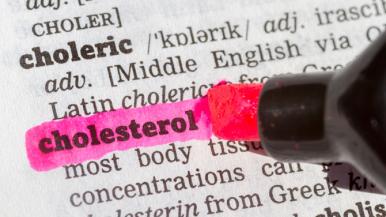We tend to associate cholesterol with bad stuff like heart disease and stroke, and for good reason. But the truth about this waxy substance in our blood is a bit more nuanced. Here's what you need to know about cholesterol, and what you can do to help keep it under control.
1. Seventy-five percent of your total cholesterol arises naturally from your body (it's produced by your liver).
Twenty-five percent comes from animal food products you eat (e.g., meat, cheese and eggs).
So while you may be partially at the mercy of your body's genetic code when it comes to cholesterol levels — genetic defects can cause excessive production of low-density lipoproteins (LDLs) or decrease your body's ability to purge LDLs — you can help control your levels by choosing foods wisely.
2. Your body needs cholesterol to perform valuable functions but doesn't need dietary cholesterol to do its job.
It may take the blame for causing arterial blockages that can lead to heart disease and stroke, but cholesterol is essential for maintaining healthy cell walls and producing vitamin D as well as the sex hormones androgen and estrogen.
And the fact is, your body produces enough cholesterol to handle all these jobs; you don't need the cholesterol you get from food for your body to operate properly.
3. Cholesterol recommendations sometimes vary, and the numbers can be confusing.
That's why it's important to know your levels and know what they mean. There's "good" cholesterol — high-density lipoproteins, or HDLs — and "bad" cholesterol, LDLs. Add them together and you get your total cholesterol.
A healthy scenario: a total cholesterol level under 200 mg/dL, an HDL level of 60 mg/dL or higher, and an LDL level below 100 mg/dL.
4. Medicine isn't the only way to reduce your cholesterol.
Consider including these cholesterol-lowering foods to your daily diet: oatmeal, bran and other high-fiber foods; walnuts; almonds; and olive oil.
Exercise can also reduce cholesterol by increasing HDLs and decreasing LDLs as well as by improving circulation.
While you may be partially at the mercy of your body's genetic code when it comes to cholesterol levels ... you can help control your levels by choosing foods wisely.
5. In the United States, more women than men have high cholesterol.
Although men have higher total cholesterol levels than women before the age of menopause, women's cholesterol levels jump above those of men around the age of 55.
Another gender difference: Low levels of HDLs appear to be a bigger risk factor for heart disease in women than they are in men.
6. Bad cholesterol's trouble-making sidekick, lipoprotein A, may increase the risk of early heart disease.
Do you or any family members have a history of heart disease or circulatory disease at a young age? Talk to your doctor about blood testing for lipoprotein A (Lpa).
Lpa clings to "bad cholesterol" (low-density lipoprotein or LDL) and when found in high levels has been associated with an increased risk of heart disease and heart attack, stroke and blood clots.
If you have high levels of Lpa, doctors can work with you to take steps to help keep you healthy, such as lowering your LDL levels and taking daily doses of baby aspirin to reduce your risk of blood clots.




